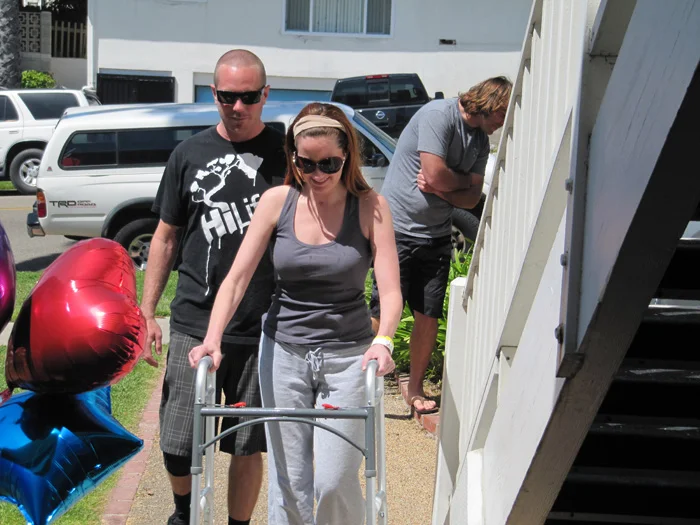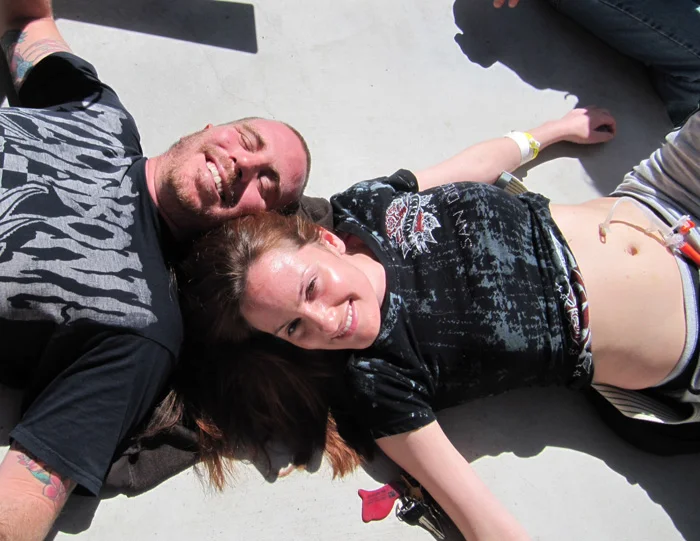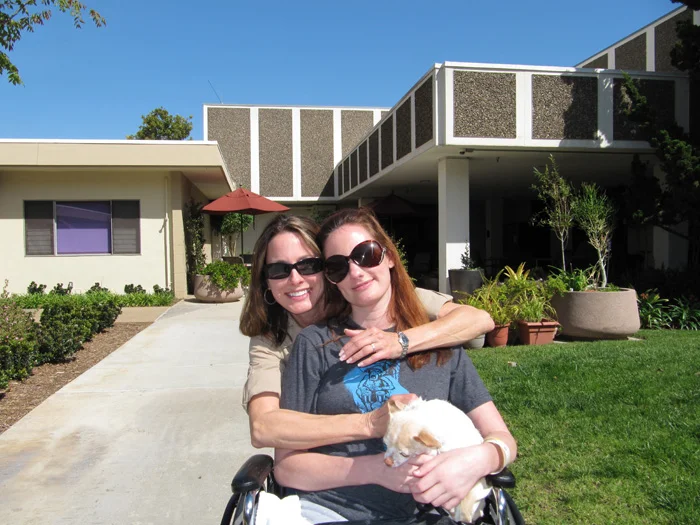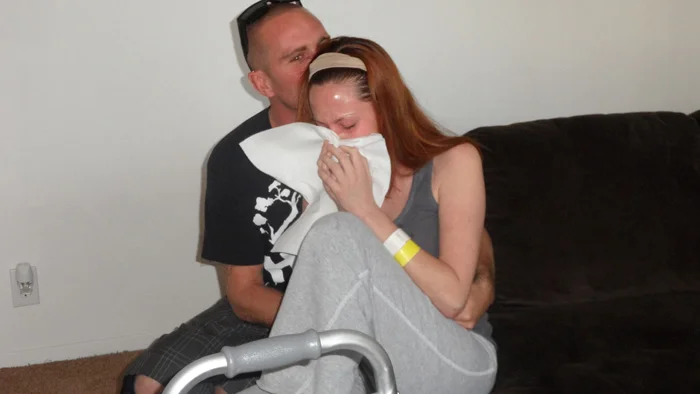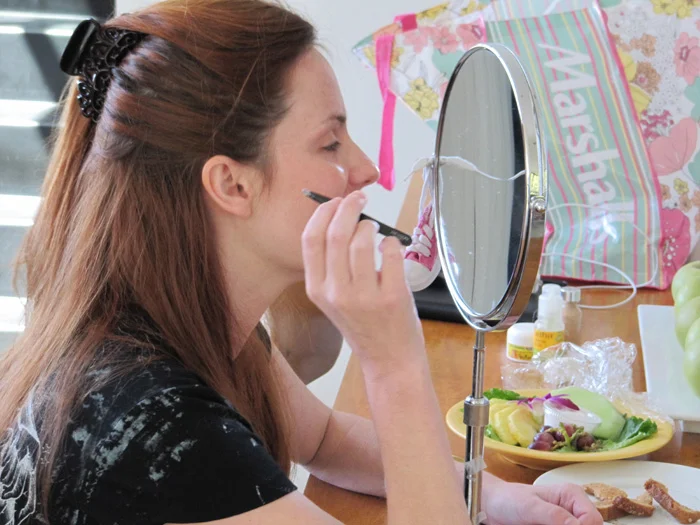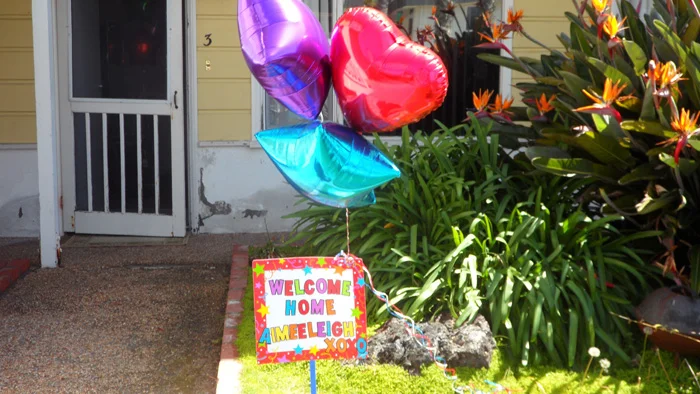When I was in the hospital, I was one of the lucky ones.
I had a lot of physical contact with my family and friends. Although I had zero motor function, I could feel everything, so I really came to appreciate the touch of my loved ones.
Despite all the tubes and wires leading into and out of my body, my boyfriend, from day one, navigated the chaos to lay beside me in my hospital bed. Both of my fathers rubbed, stretched and exercised my contracted limbs daily. My brother would hold my hand continuously and stroke my head lovingly during his visits. Before starting my daily "beauty" ritual, my mother's would crawl into bed with me for a snuggle.
I was also fortunate enough to have a family friend, who was a massage therapist.
It was just days after my stroke when he gave me my first massage. I was so ill and medicated, I barely remember it. However, the second time was weeks later, it proved to be a very profound experience for me.
At the time of this second massage, I had been hospitalized for nearly two months. I was unable to move purposefully or speak. The infections in my body were making a "last stand." You name the body part, mine was probably infected. My immune system was in overdrive; I was fighting fevers, and had a wrenching cough.
Dealing with pain becomes routine in an in-patient, acute-care facility. The fact is, despite clinicians best intentions, "procedures" usually hurt. For example, during my three month stay, I regularly had adhesive pulled off the most tender parts of my inner arm, IVs plunged into my bony little hands, and catheters painfully violated my orifices on a daily bases.
One particularly long night, the doctor informed me that my fever had to be brought down; it was dangerously high and affecting my heart-rate. He ordered a potentially life-saving ice bath.
I remember three over-worked, night-shift LVNs, all chatting to each other in foreign tongue, bustling around my room. Without so much as making eye contact with me, they packed my body with ice. These packs were placed behind my neck and knees, in my armpits, groin, and elbows. I didn't have control over my lungs or vocal chords yet, so all I could do was moan and whimper. That's a memory that still makes me shudder.
Painful situations, such as these, made my second massage, become emblazoned on my psyche.
During my massage, my room was made quiet. Only the soft glow of the machines lit the room. Tranquil music was put on. My bed was laid as flat as my weak lungs could tolerate.
My massage therapist, Zachary, began. The scene almost seemed "normal." The massage felt so good on my tense, mostly paralyzed body. I stared at the tiled ceiling and and was overcome with emotion. My sobs drowned out the music. Big, wet, tears of happiness rolled into my ears.
I was being touched for no medical reason whatsoever. The massage was just to make me feel good, and it was amazing. I felt like a piece of my soul was being healed.
May 2014 - I ran into Zach in San Diego recently
The healing power of touch that I was experiencing was not unique. According to Dr. Tiffany Field, the premier expert in her field, and the director of The Touch Research Institute of Pediatrics at The University of Miami School of Medicine, various types of touch therapy have been shown to reduce depression, pain response, and can even increase immune function.
It seems intuitive, really. We have all experienced the positive effects of touch. It's well known that a reassuring hug from a friend can improve our mood significantly, and that holding our partner's hand can make us feel more secure and loved.
Many experts agree. For example, an experimental psychologist at DePauw University in Indiana, Matt Hertenstein, says that, "Hand-holding or hugging results in a decrease of the stress hormone cortisol." In laymen's terms, he is suggesting that touch can lessen how one's body responds to stress.
I know that what I experienced during my three months in the hospital, was NOT just physical healing. I had a truly miraculous recovery. I healed spiritually, psychologically and emotionally. I KNOW that the hugs, cuddling, hand-holding, grooming, and the massages I experienced, aided in my recovery.
March 2012 - My good friend, Frank, came to visit me in rehab
If it wasn't for my friends and family loving on me for those three months, I'm not sure that I would have ever been touched in a non-clinical way.
If you encounter a loved-one with a seemingly insurmountable situation, why not attempt to start the healing with a hug? It might not make everything "all better," but it's a wonderful place to begin the journey.



